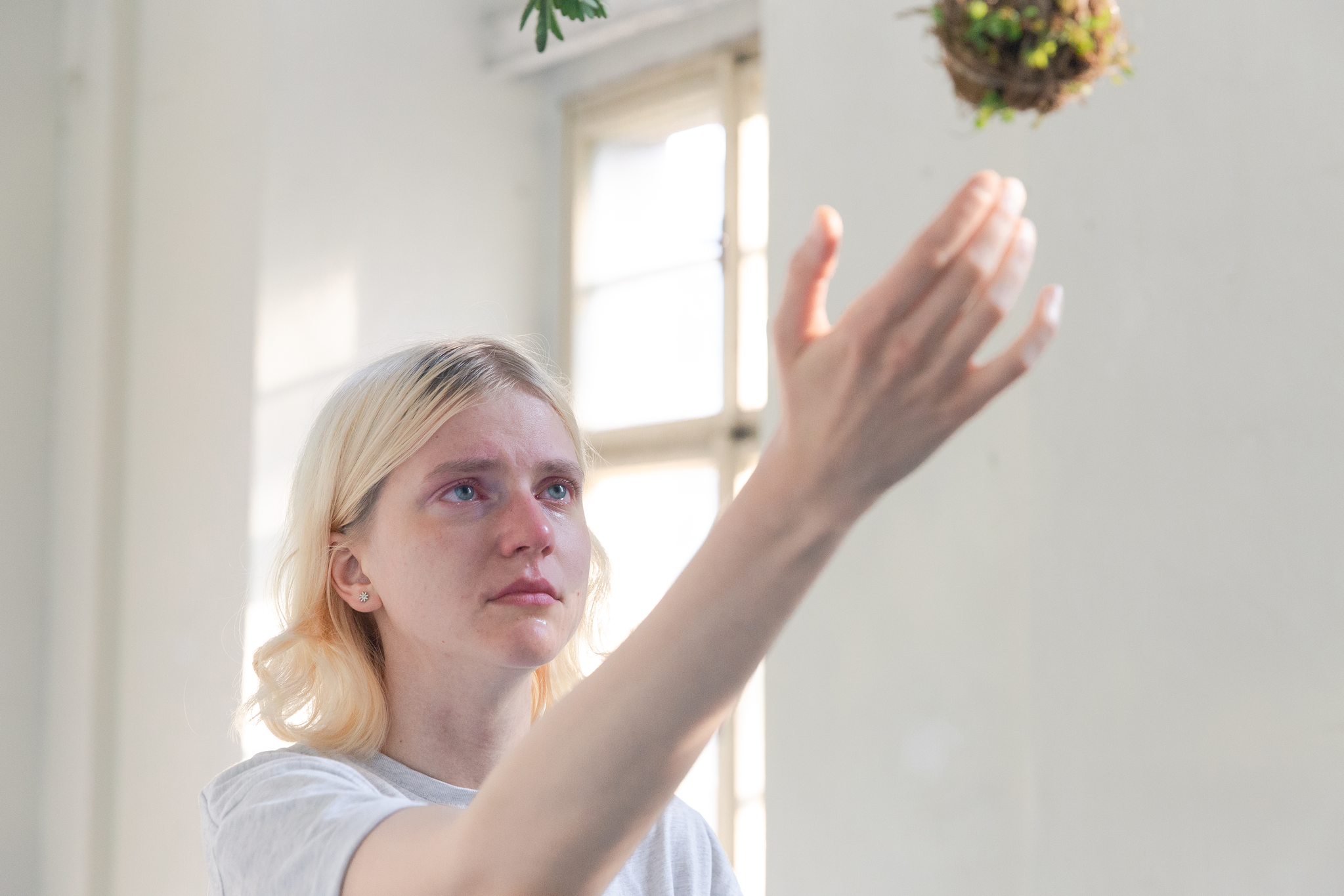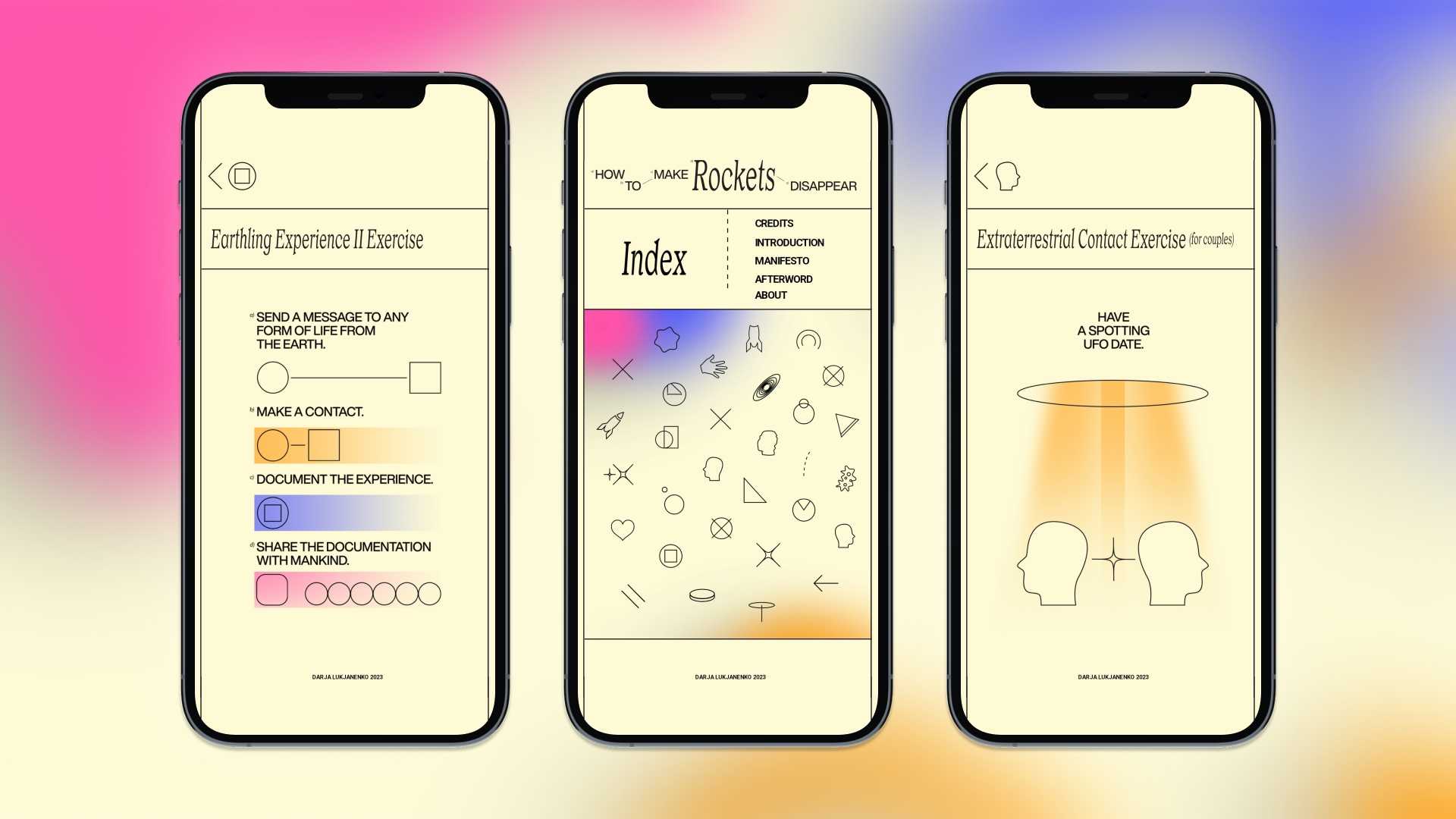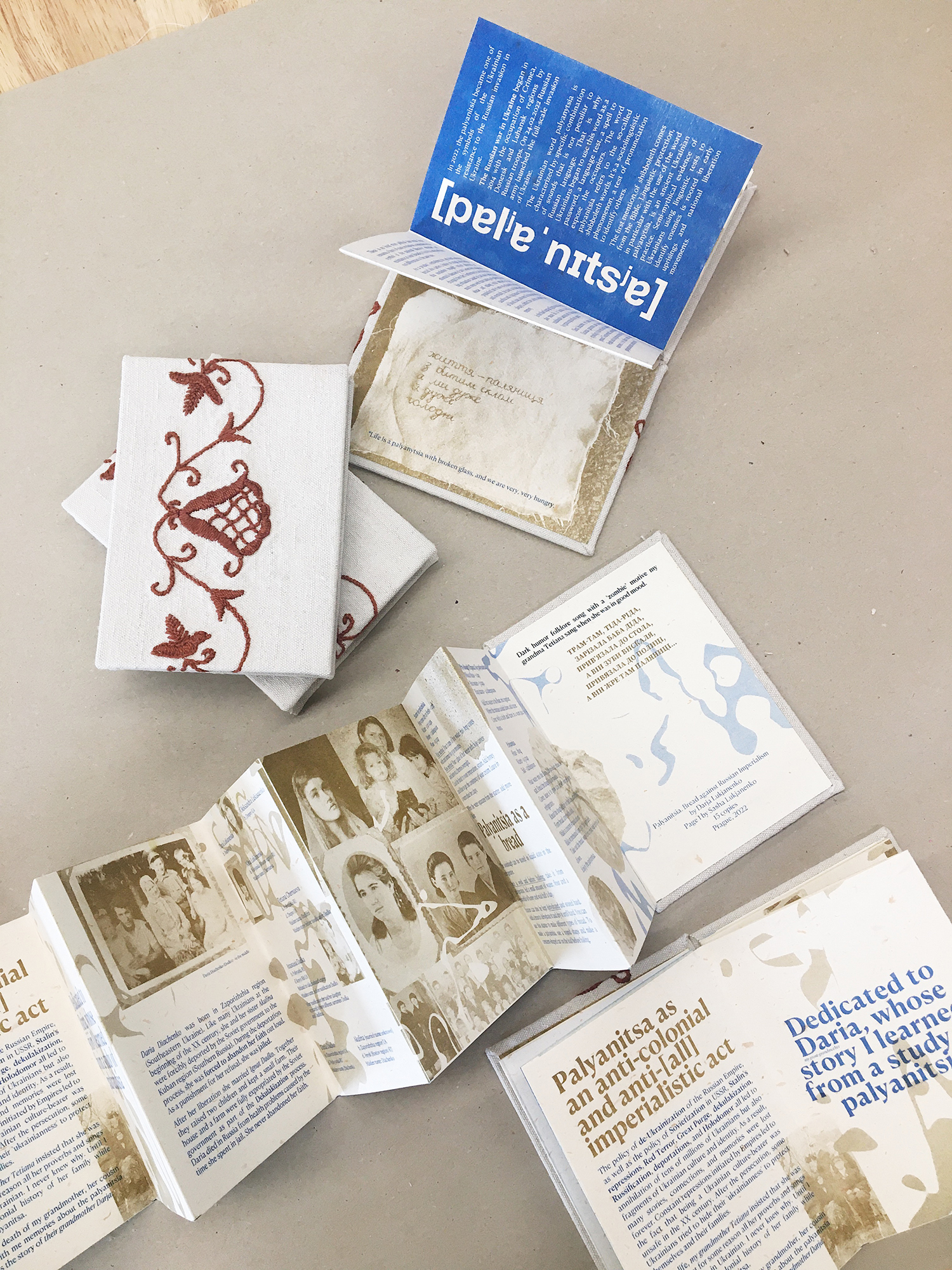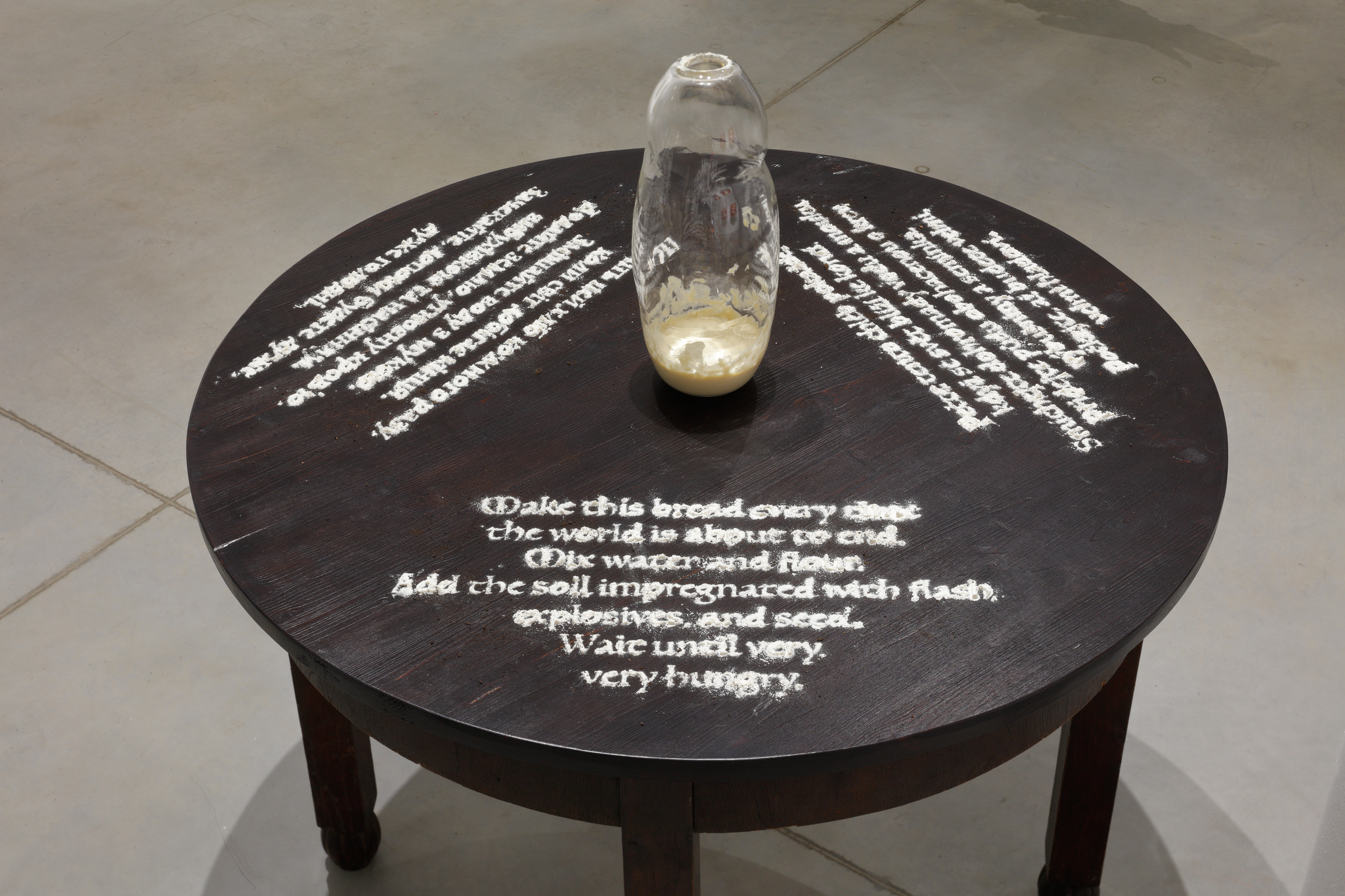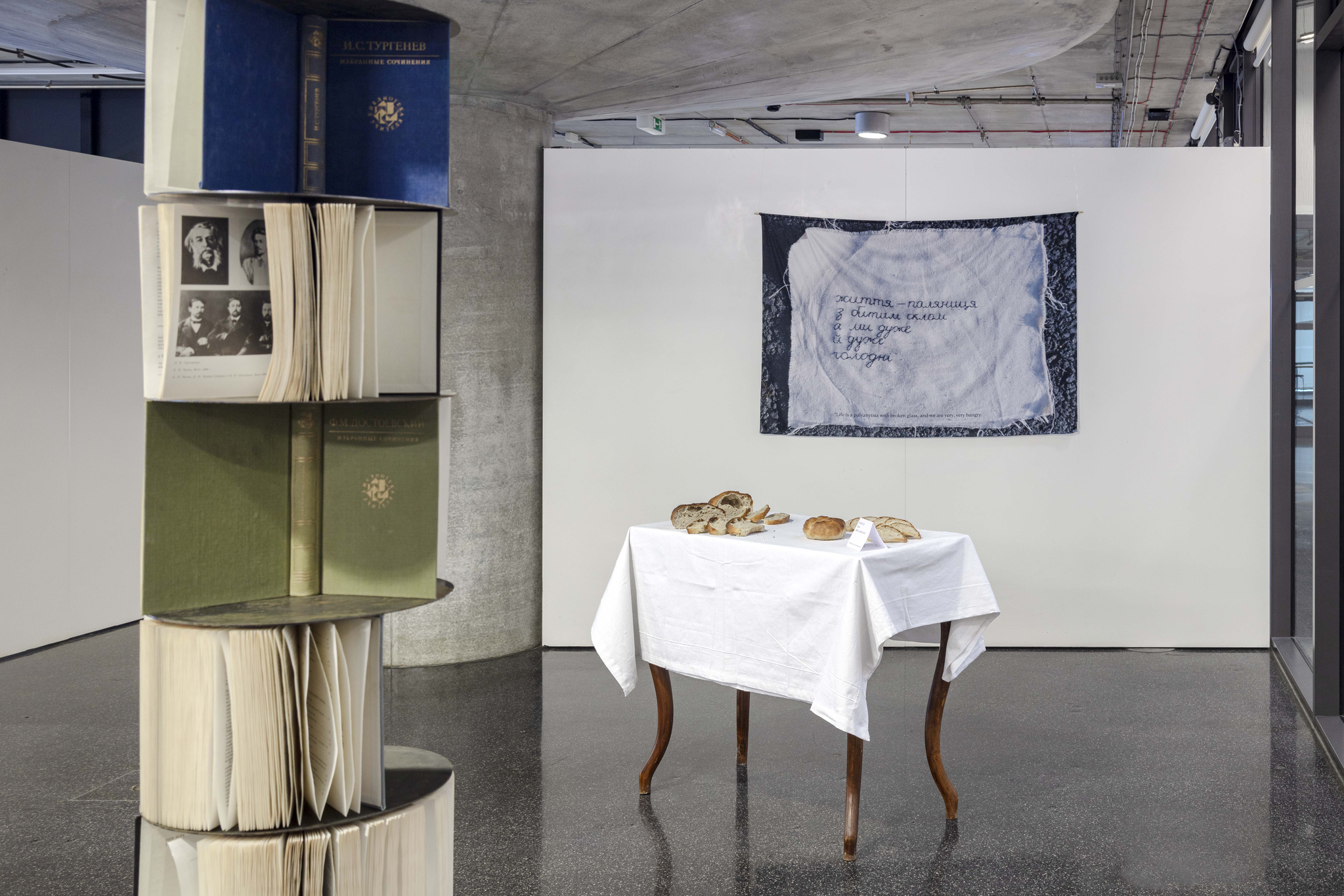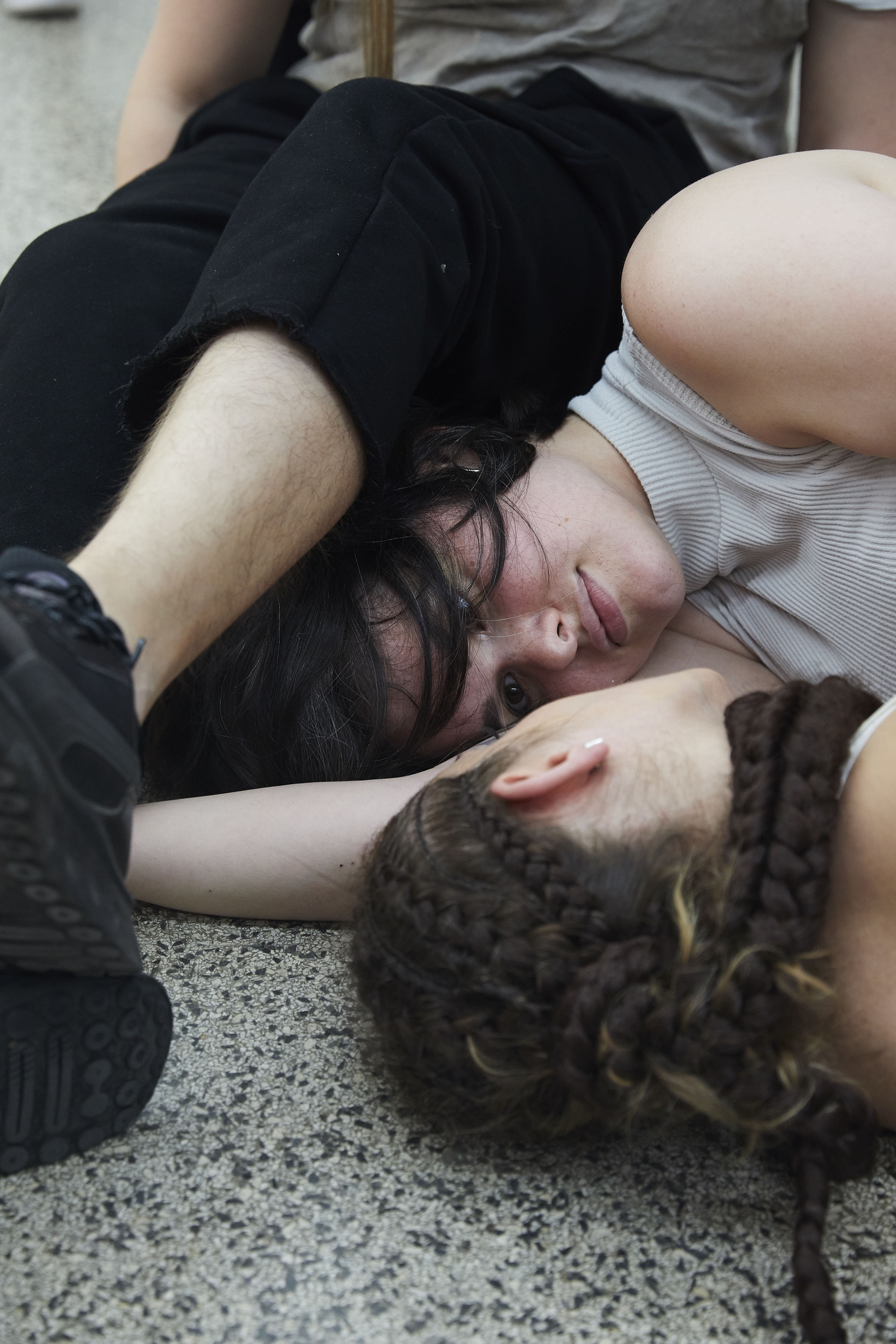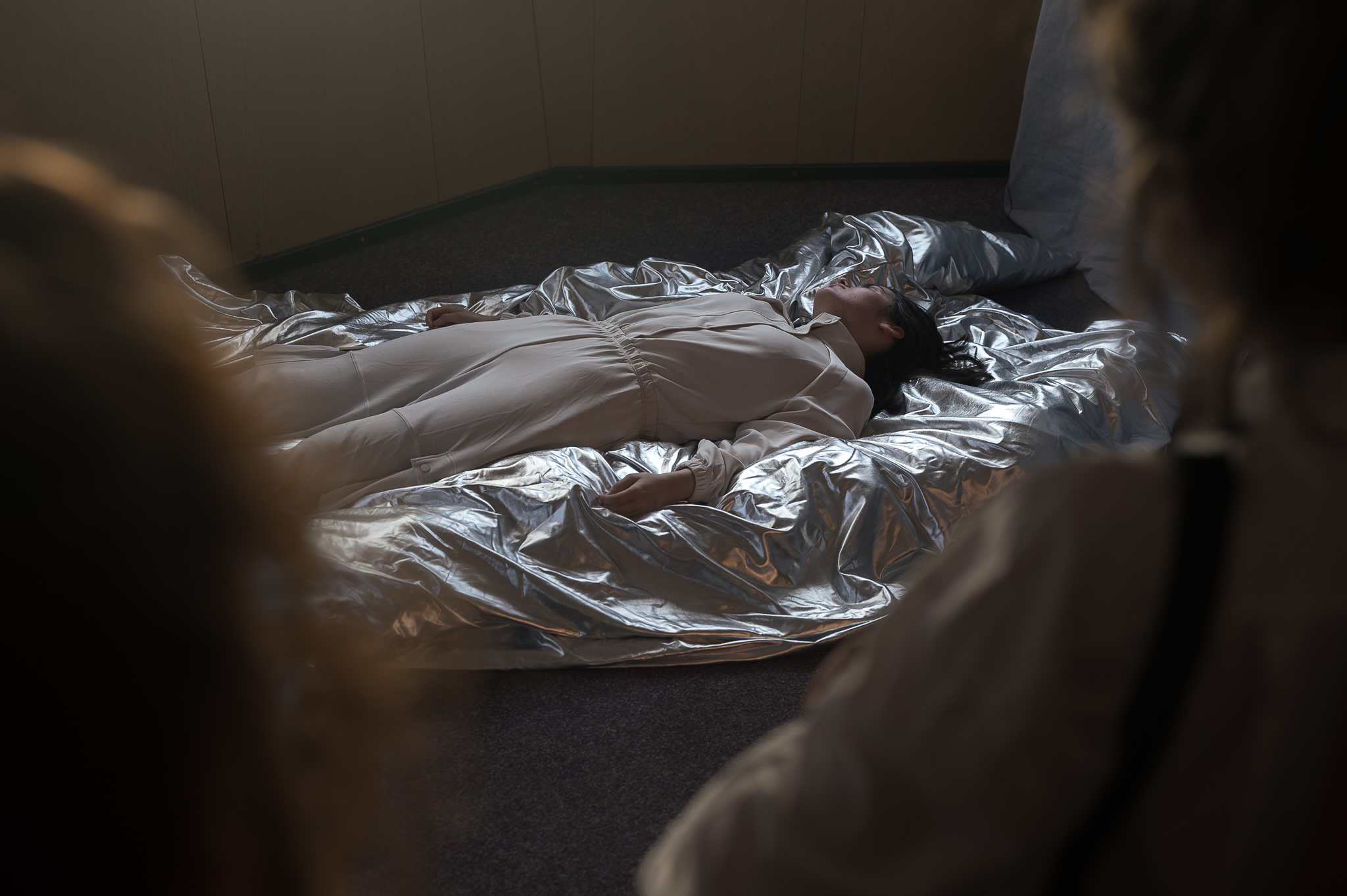Darja Lukjanenko / Дар'я Лук'яненко was born in 1994 in Dnipropetrovsk in the east of Ukraine (as a result of decommunization and desovietization of Ukraine, the city was renamed Dnipro in 2016). During the times of Soviet Union, Dnipropetrovsk used to be a “closed city” and one of the largest Soviet centers of the arms and space industries.
Darja Lukjanenko first studied journalism in Dnipro; she obtained her bachelor’s degree in 2016 (Faculty of Systems and Means of Mass Communication, Oles Honchar Dnipro National University, Dnipro, Ukraine). She then went to the Czech Republic, where, in 2017–2023, she studied at UMPRUM (Academy of Arts, Architecture and Design in Prague) at the Studio of Photography headed by Alexandra Vajd and Martins Kohout. Her diploma project “How to Make Rockets Disappear” was nominated for the Czech Grand Design Awards 2023 as the Discovery of the Year. Since 2023, she has been studying a PhD program at the Faculty of Art and Design at Jan Evangelista Purkyně University in Ústí nad Labem.
Darja Lukjanenko’s work is interdisciplinary and intermedia, combining photography and performance with text and gardening. It is based on the exploration of empathy and forms of social relationships that are not governed by power dominance. Since 2022, she has been monitoring and critically reflecting on the strategies and actions of Russian imperialism aimed at subjugation of Ukraine and destruction of its identity. Darja Lukjanenko focuses on Ukrainian culture and issues of collective memory. As an artist with background in journalism, she is engaged in cultural and political decolonization of Ukraine. She also examines collective memory in Ukraine after 2014. Her works were exhibited in the Czech Republic, Ukraine, USA, Sweden, Greece, Poland and other countries.
LADA HUBATOVÁ-VACKOVÁ’S INTERVIEW
WITH DARJA LUKJANENKO,
MAY 2024
Lada Hubatová-Vacková: You were born in Dnipro, a city that is sometimes referred to by its Soviet name Dnipropetrovsk. In what contexts is this city important for your current work?
Darja Lukjanenko: I make sure that I always state I’m from Dnipro. I want to respect the process of decolonization. I started looking into the history of the city, because I realized that the things I had learned at school were the Soviet version of the history of Dnipro. Dnipropetrovsk came into use during the Soviet era, when Petrovsky was an important ideological figure (Note: Grigory Petrovsky / Григо́рій Іва́нович Петро́вський was a prominent Ukrainian Communist, Bolshevik and one of the architects of Ukrainian genocide – Holodomor). The previous name, Yekaterinoslav, was also associated with ideology. Not Soviet, but with Russian empire. It was a name given by the empire, the dominant country. So there have been several transformations. In the past, the city was once named Novyi Kodak (Новий Кодак), but nobody uses that anymore. There’s probably no point in going back there. Therefore I respect the latest version, Dnipro, which is identical with the name of the river and does not contain the ideological component: it wasn’t determined “from above” by the empire, but finally chosen by the people of the city.
LHV: Yes, I noticed that your resume says that you were born in Dnipro, but your university is in Dnipropetrovsk...
DL: The official decommunization of the city has been challenging, because there’s a lot of documents that need to be changed. It was agreed that the city would be renamed as soon as possible, and the region would be renamed later, because it’s a costly endeavor. So the region remains Dnipropetrovsk for now. Moreover, changing official documents isn’t high on the priority list now – during wartime. Both versions, the past and the present, exist at the same time. It’s very typical of Dnipro, in which the shadows of the past are still visible.
LHV: You mentioned the Soviet curriculum at your primary school. Despite the fact you were born in 1994, into free, independent Ukraine. So even though you were born in post-Soviet Ukraine, can you recall and state some moments in your educational process that are linked with the imperial and colonialist – Soviet – past?
DL: Changing the education system is no easy feat. That was apparent even twenty years after the declaration of Ukrainian independence. A strong echo of the Soviet era persisted throughout my education, for example, in history narratives. When I studied journalism, we were taught history of Russian, Soviet journalism. I didn’t really think about it at the time. I grew up in it and so it felt natural and normal to me. I only started asking such questions a few years ago, when I gained some distance from this situation. I heard different opinions and read about postcolonial histories of other countries and understood that the narratives I was taught in school were imperialist and Soviet, remnants of the past regime and the previous century.
LHV: But you have already studied in Ukrainian, am I right? Or was Russian mandatory for you?
DL: Well, that’s an important topic for me. At the primary school, I studied in Russian. Then we had several subjects in Ukrainian at the high school. But that was completely normal in our region. Most people in Dnipropetrovsk region and Dnipro speak Russian. I grew up in a Ukrainian Russian-speaking family, went to a Russian-language school and studied Russian literature. In the end, I felt I knew more about the Russian culture than the Ukrainian culture... But the important thing for me is that I never felt oppressed for speaking Russian. I could receive full education in Russian. The myth that Russia created to justify the invasion, that they’re trying to protect the interests of Russian-speaking people, is complete nonsense. Nobody was repressing my interests. After all, it was easier to get information in Dnipro when speaking Russian.
LHV: So you spoke Russian at home and your mother tongue is Russian.
DL: Yes, but I can speak Ukrainian too. However, my family has been speaking Ukrainian only for two years now.
LHV: Have you decided to boycott Russian?
DL: Yes, completely. For example, my mom was born in Russia during the times of Soviet Union, so when she went to school in Ukraine, Ukrainian was optional. She never studied it. But now she speaks quite well, she learned it herself, because she no longer wants to speak Russian. I think that we all realized that Russian language wasn’t our choice and that it’s a result of Russification policies. Last week I heard an interesting quote from an interview with a Ukrainian writer Oksana Zabuzhko. She said that if someone in your family speaks Russian, it’s likely connected to some horrifying event that happened to your ancestors. Either they couldn’t get work, or they survived Holodomor or were oppressed for their language. They switched to Russian only to protect their family or to provide it with the best possible living conditions. Some of my friends who are now starting to speak Ukrainian say that they are, in fact, not starting to speak Ukrainian, but are making a “comeback” to Ukrainian, a certain transgenerational return to their native language.
The story of my family confirms that it may be connected to a story of one of my grandfathers or grandmothers. During my research, I found documents that showed my great-great-grandmother had been deported from Ukraine to Russia and two whole generations had passed before they were able to return to Ukraine.
LHV: So that great-great-grandmother was born in Ukraine?
DL: Yes, she was born near Zaporizhzhia in the Cossack region and was deported at the beginning of the twentieth century in one of the waves of deportation. Unfortunately, we don’t have any documents, we only have one photo. We’ve also learned that she was imprisoned for having a “strong faith” and didn’t want to renounce it publicly. It was a semi-official incarceration. They wanted her to say out loud that she didn’t believe in God, because the Soviet state was atheistic.
LHB: So this happened in the era of Soviet Union, in 1920s?
DL: Yes. Afterwards, she lived and died in Soviet Russia. Only her granddaughter could come back. So that’s why my mom was born in Russia and why they moved back to Ukraine with my grandmother. It’s just that nobody talked much about the story. My grandmother always said that she was proud she spoke Russian. She was proud of the Russian culture. She changed her identity. But we never knew why she also spoke Ukrainian and sang Ukrainian songs. I only understood a few years ago when I was doing that research.
LHV: Your grandmother and mother did not talk about their life in Russia. Was it taboo?
DL: No, we didn’t talk about it in the family.
LHV: Your mom was born in Soviet Russia. Where exactly?
DL: She was born in Kuban in southwestern Russia. At that time, many Ukrainians lived there, who had been deported.
LHV: Is the hatred towards Russian imperialism and dominance generational? Are Holodomor, which is now recognized as a preconceived imperialist genocide of Ukrainians, and forced collectivization still alive in the collective memory?
DL: It wasn’t always about someone being against the Soviet regime. Very often, people were oppressed just because they were Ukrainians. The Soviet Union tried to erase Ukrainian identity in our country. They planted Russians in Ukraine and dispersed Ukrainians; those who disagreed were deported to Siberia, some to Kazakhstan.
LHV: Russians also wanted to expand and reinforce their influence through the population they planted in Ukraine, is that right?
DL: Yes.
LHV: Dnipro has historically and even recently been known as the center of manufacture of warheads, arms industry and space research. Is the arms industry still an inseparable part of the city’s identity? And if so, how is that apparent?
DL: This is what I’m dealing with in my own work. When I started studying at UMPRUM, my friends and colleagues asked me what was there to see in Dnipro, if I recommend visiting the city; I kept telling them that it’s the most boring city with nothing to offer and that I have nothing to say about it. It was partly because of the fact I had no other experience and grew up in the culture of “inferiority”, which denotes the feelings of inferiority, worthlessness and insignificance instilled in Ukrainians by the Russian empire. I didn’t visit any other countries, haven’t gotten to know any other kind of life. Before I entered UMPRUM, I had never been abroad. I didn’t have any comparison. Dnipro represented normal conditions for life and when you walk among rockets every day, you don’t notice that they’re rockets or anything unusual. It’s part of your surroundings. I only noticed it in hindsight, from distance, when I could look at it with different eyes from the outside instead of looking from inside. That’s how my art project “How to Make Rockets Disappear” originated. The first question I asked myself was: “How could I not see the rockets..., they are so huge!” After Maidan in 2014, Dnipro also joined the decommunization efforts. We got rid of Lenin monument and monuments of other Soviet ideological figures whose statues persisted in the city, even though they were responsible for Holodomor or other instruments of repression. This way Dnipro freed a part of its space from Soviet ideology. (Note: Maidan, or Euromaidan, Євромайдан in Ukrainian, was a series of mass demonstrations in Ukraine held from November 2013 to February 2014 that led to a so-called Revolution of Dignity, ousting of pro-Russian president Viktor Yanukovych and establishment of an interim government that gained the trust of European Union. However, Russia considered this government illegitimate.)
LHV: Russians must have been enraged when you started removing the statues. The ideological relicts of their reign. They must have felt the sign of their dominance was being removed. How did decommunization go in Dnipro?
DL: The older generation took it personally. I can imagine that my grandmother wouldn’t approve of it either. She was so proud to be a Soviet person. She died because of the poor working conditions in the Soviet factory at which she had been working. Dnipropetrovsk region is very industrial, and the air is polluted...
LHV: However, your parents were already in favor of decommunization, is that right?
DL: In 2014, you could feel that the majority supports it. My parents supported it. These decommunization efforts were not initiated by the actions of the government. Thousands of people gathered in the square and acted. The system had to adapt, but it only reacted to a natural turn of events.
LHV: In 2018, I visited the former Subcarpathian Ruthenia, which was part of Czechoslovakia between 1919 and 1939 and after World War II, it became part of the Soviet Union and Soviet Ukraine. During my visits of museums in Uzhhorod and Mukachevo, I noticed that the historical narratives have not been revised by the process of decommunization at all. The exhibitions still promoted the unrevised Soviet history – for instance, at the castle in Mukachevo, there was an obsolete display that glorified Brezhnev. In our country, the revisions happened quite fast. The postcommunist, post-Soviet narrative after 1989 had different form. I was shocked by what I saw in Mukachevo. It seemed to me that people in Ukraine have underestimated the social need for historical reinterpretation. Do you think it was a mistake and that the history should have been retold systematically?
DL: Systemic loyalty to Soviet and Russian narratives peaked rather late – in 2013. We were led by President Yanukovych who did all he could to turn us into a Russian colony again. That was the reason the revolution started along with the horizontal processes I have mentioned. The system did not pursue decommunization, because it was operated by hardline Russian loyalists.
LHV: Did you feel tension between Russians and Ukrainians in your hometown before 2014?
DL: Not at all. I went home recently, and I can say that many Ukrainians speak Russian to this day. But it’s not a problem, nobody condemns them. Everyone realizes that we’re so traumatized now that we must be kind to one another.
There was no tension between Ukrainians and Russians. I spoke Russian until 2022, and it was fine. I’d rather I didn’t, but I still remember bits of Russian poetry, while I can’t recall any Ukrainian poems. My old environment was set up predominantly for Russian speakers.
LHV: When you were in the first grade at the elementary school in Dnipro, did you write using Russian or Ukrainian Cyrillic?
DL: We studied both languages since the first grade. We could therefore easily switch from one to the other. It only felt strange at the beginning to speak Ukrainian to someone I was used to speaking Russian with. It’s easier for me to speak Ukrainian to someone I’ve only gotten to know now. I’m currently trying to speak Ukrainian with my grandmother and grandfather, who both spoke Russian for seventy years. But they want to use Ukrainian and are slowly switching to it now.
LHV: You are the only person in your family who moved here, others stayed in Dnipro. Do they want to remain in Dnipro?
DL: When the full-scale invasion started, I was mean to them. I couldn’t understand why they wouldn’t move and live in safety. Only then I realized that being a foreigner can be just as traumatic for some people as staying behind and experiencing war.
They’re still planting saplings and growing stuff in the garden, looking forward to flowers or apples. Their home is their source of security. It’s a better choice for their mental health. Even if their lives are in danger, I try to respect that.
LHV: Did the Chernobyl disaster in 1986 affect Dnipro as well?
DL: It affected the whole of Ukraine. Many people from Dnipro actually helped with the evacuation. Some members of our extended family died because of this. Then I have friends who lost one or both parents. My generation suffers from thyroid disorders more often, that’s another consequence.
LHV: As regards the current war and the Russian invasion that has been going on since the annexation of Crimea in 2014 and then from February 2022, can I ask... Did your father have to enlist?
DL: Not yet, my dad is a volunteer. But I am worried he might, and I know that soon, volunteers like my father will have to join the army too.
LHV: What is the current situation in Dnipro at the time we are having this conversation, i.e. in May 2024? Is it – at least relatively – quiet?
DL: Unfortunately, no. At the beginning of the year, our apartment was hit by a blast wave. The Russians bombed the maternity hospital next to our house and we lost all the windows including the frames. It was then when I first learned that it’s impossible to install windows at sub-zero temperatures, because it’s extremely difficult to seal them. We were waiting so eagerly for warmer weather that would allow us to fit new windows in the walls.
LHV: And where did your parents stay in the meantime?
DL: Someplace else.
LHV: You mentioned that being a foreigner could be traumatizing. Do you have a hard time with the uprootedness at your home in Prague?
DL: I don’t feel too bad. But I know that many people are having a much harder time. I’m the type that’s fine if left on their own. I can read, I have no problem going to the movies alone. I just miss my family now; I can’t visit them as often as I used to. I used to go home every three weeks, even though the journey takes 36 hours.
I don’t carry the “foreigner’s trauma”. When I moved here, I wanted to start from scratch, change my life. I studied journalism before that, and I worked in the field. I wanted to try something new; it was a perfect change for me. However, older people that have already built their life to some extent can be traumatized by the uprootedness.
LHV: Why did you decide to study journalism in Dnipro? Did you want to be politically engaged, did you feel a visceral need for activism?
DL: I wanted to study a creative field and so I chose something that seemed like one to me. The experience of a previously closed city without developed cultural traffic also played an important role.
LHV: What do you mean by “closed city”?
DL: In Soviet times, it was a closed city because of the nuclear missile factory. Foreigners were strictly prohibited from entry to Dnipro and the people who worked at the factory were not allowed to travel.
LHV: But during your time there, Dnipro was no longer a closed city, right?
DL: This was no longer the case in independent Ukraine. In 1994, the year I was born, Ukraine signed a Demilitarization Act and became the only country in the world that rejected nuclear weapons. At one point, Ukraine had the third largest stockpile of nuclear weapons in the world, but by signing the demilitarization agreement, it exchanged them for a territorial guarantee from Russia, the United Kingdom and the USA.
LHV: But current reality seems to be different...
DL: It was a utopian peace gesture. The missiles were then transferred to Russia, that was part of the deal. So now they own the missiles from Dnipro factory. That factory no longer makes nuclear weapons; for a long time, it has specialized in components for space research.
LHV: Did factories shift to space research, or did they used to do both – along with arms manufacture – under the previous regime?
DL: They used to do both. It’s just my opinion, but now that I’m working on my rocket-themed projects, I feel that the discourse about conquering space was just a ruse for armament.
LHV: Do you continue to use your journalist skills? Are you in touch with journalists in Ukraine?
DL: Let me clarify briefly. I come from the former “closed city” Dnipro, which hasn’t been developing its cultural sphere for a very long time. Although it’s been open since 1988 and even more in 1994 in independent Ukraine, there wasn’t enough time for the culture to develop.
My choice of journalism was influenced by the fact that it was a more developed field. Many creative people from Dnipro went to study journalism, either because they couldn’t or didn’t want to study in a different city. Presently, I incorporate verbal components in my work, so I don’t regret studying journalism. It was very useful. To this day, I consider it a creative field, because working with words is a sort of artistic, creative work.
LHV: Could you explain under what circumstances you relocated to the Czech Republic and entered UMPRUM in Prague specifically?
DL: It happened at the best possible moment. I needed to gather courage, naivety and a bit of craziness. I learned about UMPRUM from a friend who, in turn, heard about it from someone else. I found it on the internet, and it intrigued me so much I just decided to go for it. But it wasn’t so easy. Ukraine didn’t have a visa-free regime yet, and my parents did not have the funds to support me. I had to work in corporate for one year. I landed a great role as a “senior specialist of the internal PR project”. Its purpose was to maintain a healthy work environment for the employees. However, for me it was just a means of getting to Prague. I took the pay, bought a computer and traveled to take the entrance exam.
LHV: When did you come to Prague?
DL: In 2016.
LHV: Did you have any relatives or friends you could turn to?
DL: I knew Masha Kovtun lived here and studied at UMPRUM. But she lived in Plzeň at that time. When I was drawing up my budget, I forgot to add the costs of accommodation. When I arrived, I had nowhere to stay. I asked Masha to introduce me to some people in Prague that would let me stay at their place. I spent 56 days sleeping in different apartments, on the floor at places of people I didn’t know. The fact I had to communicate with many people meant I could take the entrance exam early and take the Czech language exam, because I needed a certificate.
LHV: Did you learn Czech before you came to Prague?
DL: Just a little. Self-study at home. I learned Czech mostly on the spot. This stressful situation was motivating. I needed to reach A2 level to be admitted to the entrance exam.
LHV: Did you have any financial support or scholarship at the beginning of your studies?
DL: No, I didn’t. I had to find a job right away.
LHV: Can I ask what work you did?
DL: I had several jobs. Flower delivery, for example. On weekends, I worked as a gallery attendant and as an extra in film productions. I had short hair, and many films shot in Prague at the time were set in the 1940s and 1950s, so I was never turned down. In the second term, I found a slightly more stable job as a tutor of drawing lessons for adults. They accepted me based on my teenage portfolio of hyper-realistic watercolors. In the second year or so, I have started working at Studio Alta, and I’ve been working there to this day. It is a cultural center focused on dance, performance and live art. I do the visuals for promotion, such as the visual concept of the season or of the events that we produce.
LHV: Why did you choose to study at the Studio of Photography?
DL: I took pictures often in Dnipro. When I wanted to get to know someone or just have fun, I would invite them for a portrait session. I had a portfolio and some more creative projects that I did specifically for entrance exams. But when I started my studies at UMPRUM, I found out that the world of contemporary art was wider, more fluid and vibrant than I had imagined. Since the first term, I’ve been doing multimedia, not pure photography. Only at UMPRUM I discovered that such thing is even possible.
LHV: Did you do any internships during your studies?
DL: I spent two semesters at AVU at the studio of a guest artist, Anton Vidokle. Since he was the chief proponent of cosmism (Note: Cosmism according to the classic theory of Konstantin Tsiolkovsky and Nikolai Fyodorov, the “founding father of cosmism”, is a philosophy that posits that the colonization of universe and attainment of immortality are the singular aim of mankind.), I told him I was against cosmism and wanted to discuss it with him and he accepted me. Then I was at the Studio Planeta B, which was the most intense term so far and it was amazing. I am very grateful for such an experience at the end of my studies. Then I spent one more term in Greece. It was a very unconventional studio (Lab 13) headed by a new professor Poka-Yio, also known as the organizer of the Athens Biennale. Otherwise, it was a traditional school that operated pretty much like an art academy in Ukraine, for instance. The classic system in which you only study how to draw a figure for several years and only then you’re allowed to experiment. But Poka-Yio used a revolutionary approach, and we did absolutely new things with him, from collective meditation to performative improvisation to creating LARPs. I can’t define the medium, but it was an interdisciplinary approach of sorts.
LHV: I know that you’re politically engaged and that you’ve had a series of lectures after the full-scale invasion began. Are you in touch with other activists here or possibly even in Ukraine?
DL: Primarily I’m in touch with Ukrainian cultural workers. I try to learn how they perceive the situation inside Ukraine. Right now, I’m in a privileged position. There are no missiles flying above my head and my life is not in immediate danger. When I express any thought, I want it to be empathetic and consistent with how the people in Ukraine see it. This is the only way I can express real support for them. And give them a voice. So I’m in close contact with artists and poets from Ukraine.
When I do lectures or art talks, I do so from a position of artistic activism that is undergoing a process of its own decolonization. I share things I have learned during my own (private) research that should help me understand how it happened that I, as a Ukrainian, was so integrated into the Russian informational and cultural context in childhood; how come that I haven’t asked why until now, why it was the case and how it is possible that we have no material artifacts from previous generations in my family.
LHV: Is the fragmented family history the result of the Ukrainian famine and frequent relocations?
DL: This is normal for most Ukrainians. Only a fraction inherited embroidered vyshyvankas or beads that are part of traditional dresses. Others have lost family heirlooms not just because they had to trade them for food during Holodomor, but also because of other repressions. However, stories persisted that prove that the endeavor to destroy culture and links to previous generations was not strong enough to eradicate everything and erase family memory completely.
LHV: In one of your projects, you mention how your grandma baked bread.
DL: That’s the grandmother that was deported. Her name was the same as mine, Darja.
When I started the project, I wanted to understand what “palianytsia” (паляниця in Ukrainian) was, because the term appeared in the information space after the beginning of the full-scale invasion. Ukrainians used to use the word as a shibboleth – as a means of communication to distinguish between compatriots and foreigners.
LHV: Is there a difference in pronunciation?
DL: It’s half myth and half truth. The truth is that there is no soft “ts” in Russian, they only have the hard sound. It’s naturally easier for Ukrainians to pronounce palianytsia. But it’s no magic, anyone can learn the correct pronunciation. However, this myth arose that Russians can’t say palianytsia.
So palianytsia started to spread as a protective word for Ukrainians and eventually foreign newspapers presented it as an interesting cultural phenomenon. But I wanted to know exactly what it was and how I could bake this bread. I approached my research from several angles. I reached out to people who specialize in the culture of food in historical context. And then I asked friends and everyone I knew to ask their grandmothers how palianytsia is made. Some came back with recipes, some didn’t. But then my mom called my grandmother’s sister. In addition to a partial recipe, she told her the story of her great-great-grandmother Darja who had been deported from Zaporizhzhia to Russia. I can’t say I haven’t heard it before, but we’ve never tackled it directly. When I found myself in the context of a full-scale invasion, the story suddenly struck me differently. I asked my mom to call once more and ask for as many details as possible. I turned it into a little book for palianytsia as bread, but also as a key to decolonizing one’s own family history.
LHV: Are there other contexts surrounding traditional Ukrainian bread?
DL: I learned that palianytsia is an old Ukrainian name for baked bread. When people in the past talked about “bread”, they meant “food” in general. The phrase “to have bread on the table” means “have enough food”. Palianytsia, however, always referred to baked bread, sometimes more specifically bread with a crescent-shaped scoring. There is no single “right” recipe for bread. Each family had their own recipe for palianytsia.
LHV: I saw photos from an installation where you mixed the bread with soil.
DL: This soil was scooped on the first day of the full-scale invasion in Kyiv, but at other places too. I met this artist-in-residence here (Bohdana Zaiats) who told me that she had brought the soil with her and that she wasn’t sure what to do with it yet. I asked her if she could share it for my project. I baked the so-called “end of the world bread” from a dough into which I added the Kyiv soil. I was surprised that people weren’t afraid to eat it. I thought the idea of eating something from a war zone might be repulsive. But during the project, I realized it can actually be pleasant. If you eat the soil, it remains in you, and no one will be able to occupy it.
LHV: For this particular project, you created a limited book edition that makes it very clear that you approached the process of searching for the recipe and baking traditional Ukrainian bread very symbolically as an “anticolonial and antiimperialist act” and also a challenge to explore your own family history.
DL: Yes. During my research, I noticed that my grandmother’s, great-grandmother’s and great-great-grandmother’s surnames were Russified several times, which was one of the means of colonization by the Soviet Union. Her original surname was “Diachenko”. After her deportation, she married a man who had been there since the wave of deportations during the times of the Russian Empire. They had deported many people from Cossack regions.
LHV: So you too have Cossack genes?
DL: From both sides. I think my family lived in eastern Ukraine for many generations and did not migrate much. Nobody’s gone as far as me. (chuckles)
My grandmother was given the surname “Dudko”. The first wave of Russification turned it into a more Russian “Dudka”. And the second wave again renamed it “Dudkina”. As there were several such waves, even the women within a single family had several versions of their surnames. My great-grandmother had a surname from the first Russification wave, her daughter had the version from the second wave and so on. This rather complicates the restoration of family stories.
LHV: Your name is also spelled differently. Sometimes it’s Daria, sometimes it’s Darja...
DL: Daria is my formal name, which I was assigned along with my passport. But I had it issued quite late, just before my studies at UMPRUM, when I was twenty or twenty-one. It’s an official Latin transliteration. Before that, I transliterated my name myself and grew attached to that version. I use the name Darja for my art projects and Daria only for official purposes. But it’s caused a bit of trouble, it’s as if I had two names. I know that many artists who come from countries where Cyrillic is used have several different transliterations of their name. I asked for an official change at the bureau, but they denied my request.
LHV: Could you mention what you are currently working on?
DL: I am currently working on my dissertation titled Post-postcolonial Identity and Reconstruction of Collective Memory in Ukraine After 2014. For many people, the process of individual decolonization began already in 2014, but in my case, it started in 2022 with the beginning of the full-scale invasion. Even though I had considered myself a Ukrainian and felt that the war had already begun. My friends and I were then working as volunteers in a center for people from the eastern regions who had lost their home. Dnipro was the first major city to which the refugees from Donetsk went. Dnipro was also an important center providing medical care to wounded soldiers.
So, I perceived the war, but the Russified environment in which I grew up made it impossible for me to see it before. My current view only took shape after the full-scale invasion began. Today I’m astonished that I didn’t notice. It’s the same as with those rockets. I walked past them every day and didn’t care about what type of missiles they were, why they were there, or where they were headed. I was oblivious to the fact the missile factories in Dnipro had been built to instill fear in the Western world. I didn’t know whether I should be afraid of the arms manufacture or take pride in it.
LHV: As you have said, you come from a Russified family. You didn’t talk about it much at home, did you?
DL: My grandparents were very proud of the fact they made the missiles and worked in those factories. It was a respected profession. Unfortunately, to this day, they won’t tell me any secrets. Although they are not obliged to anybody and the Soviet Union has been long gone, when I ask them about it, they talk about events from their lives, about trips and parties... When I was a child, they used to tell me I was smart, that I would become an engineer and make rockets.
LHV: How long have you identified with that notion?
DL: I attended a math-oriented class, and I was good at it. In the final years, we had about 4 math lessons a day. I passed the state exam in mathematics flawlessly, so I could apply to any school. It was so normal in that environment that I would never question it.
LHV: Do the facilities originally designed for production of missiles now manufacture components needed for space exploration?
DL: Nuclear missiles are definitely no longer being made there. They make components for spacecrafts, satellites.
LHV: Did they used to export them to Russia?
DL: Not only. They used to export them to the whole world. Even Elon Musk wanted to sign a contract with them, but that didn’t work out. Anyway, they still make stuff for space objects. One of the major projects after demilitarization was related to the production of missiles for seaborne missile launches for a project named “Naval Launch”.
Due to the long-standing market connection to Russia, Russians still know the entire floor plan of the factory. In the first days of the full-scale invasion, they were trying to hit the storage of toxic waste to cause an environmental disaster in Dnipro. They know a lot and they’re trying to use it to their advantage.
When I was doing my research into cosmism, I spoke to a girl whose family worked in the factory. She confided in me that back in the times of the Soviet occupation, they used to say that if a nuclear war started, Dnipro, as an arms manufacture center, would be where the first missiles strike. Everyone who worked at the factory lived with a sense of threat.
LHV: You revise your own and your family history, you rethink how you lived, how you could have lived. How can you frame this environment conceptually, what words to choose...
DL: I feel good about what I’m doing. I can’t physically save either myself or my family. I can’t physically stop the invasion. I can only raise funds for the army. But I can gradually pursue my own liberation, by speaking Ukrainian, by beginning to deal with the story of my own family and Ukrainian culture. And in that respect, I feel freer than ever before.
LHV: Does your family and people in Ukraine in general share your effort to review the recent past?
DL: Most feel the same way. If they perceived it differently, we wouldn’t have been able to resist the Russian invasion for so long. Our resolve is the highest it has been since 2014.
I know that it’s not enough to just review such things. It’s necessary to analyze and share them too. If we don’t communicate them, we won’t get any results and the whole thing can happen again. Some things may remain, but we just need to discuss how it happened and how it affects us. It concerns the simplest things, such as how we celebrate the New Year. Even the events we associate with holidays and happy moments are ideological overtones. The New Year is tied with Soviet compulsory atheism.
In my family, we try to reconstruct some traditions that would feel authentic to us. But it is difficult, because many things that were planted by the Soviet Union are already linked to nice memories. Which makes it even more unpleasant, because we realize that this is part of the colonization process. It’s then interesting to watch how we solve it at the holiday table, what kind of food we prepare. We want to rediscover and return to the Ukrainian tradition.
LHV: Do you think that today’s teachers in Ukrainian schools are trying to revise the vision of the Soviet Union? Are they successful?
DL: For me, the process didn’t start until three years ago, so I’m patient with others. But that change has definitely accelerated over the last three years.
LHV (May 19, 2024, 5:51 PM, written correspondence, one week after the interview): Darja, you just got back from Dnipro, where you visited family. If this is fine with you, could you please briefly write how are your family and the people there coping?
DL: Thank you for asking, Lada! I still have my room in Dnipro, which I used to share with my sister. I’d like to say that it’s a time capsule of sorts and that nothing has changed, but the Russian war got there too. Both the furniture and the floor are cut by the glass shards. (At the end of 2023, the windows in our apartment shattered as a result of a nearby explosion, after the Russians hit the maternity hospital with a missile. When my parents and I talked about what to do with the broken furniture, I asked them to keep it for some time as a reminder of how lucky we were that we hadn’t been in the apartment during the attack. A reminder of the fact we’re alive.) I feel like Russia has pervaded my life to a great extent. My room, my city, my friends who have been forced to abandon their artistic careers (and sometimes their lives) to defend our country. It’s getting absurd. Russia has also gotten to my grandmother who was proud of her knowledge of Russian and who has been dead for ten years. When I visited her grave, I noticed a large crater made by a Russian missile some 20 meters away.
And since I left to study in the Czech Republic, many things in Dnipro have been actively changing, there are more galleries, cultural organizations and a large cultural center. Dnipro keeps on living despite the constant threat. The people of Dnipro are my heroes. They go about their lives as if everything couldn’t be destroyed by a Russian missile strike in a split second. I think that it’s an amazing form of protest against the Russian colonialism.


